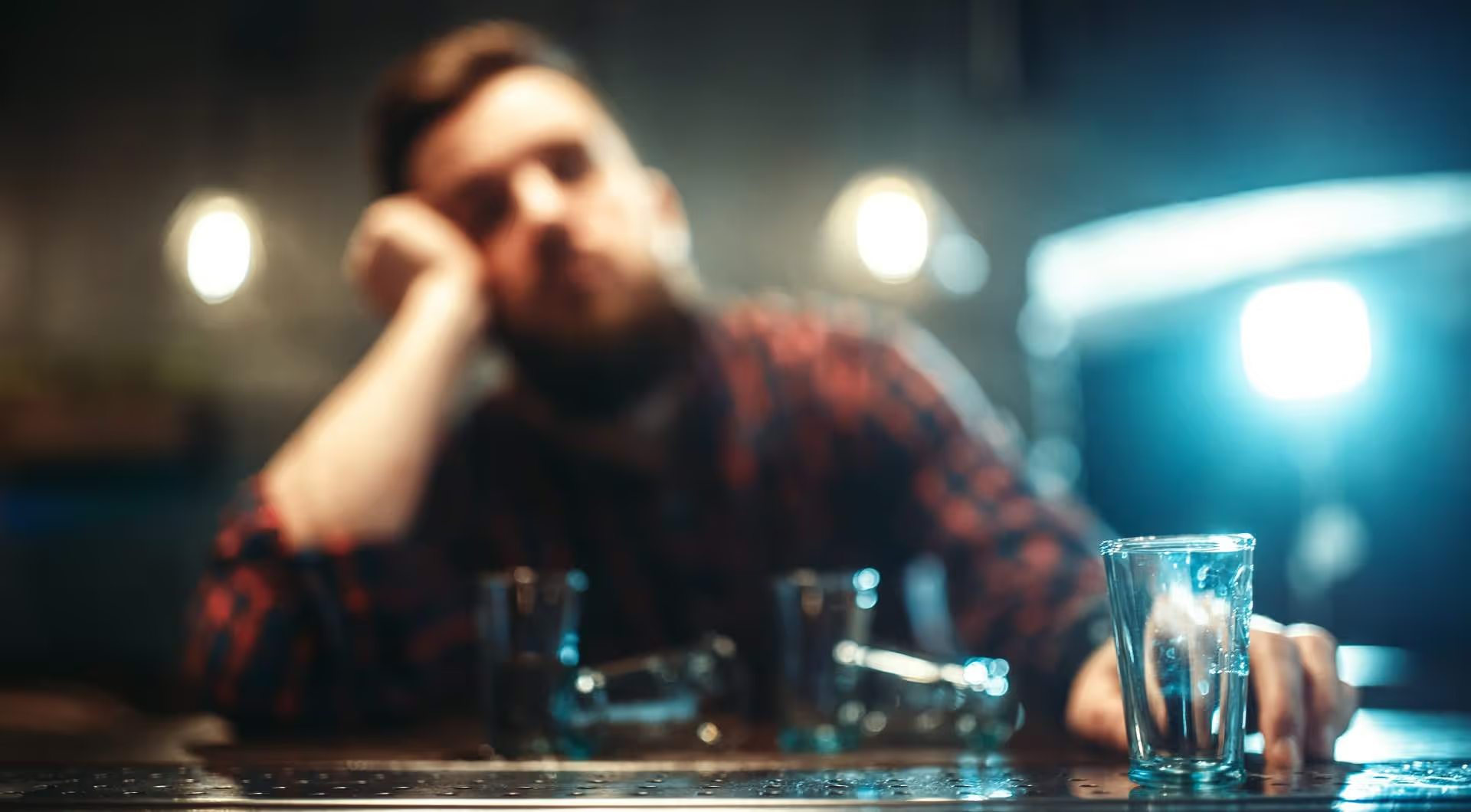Buzzed or Stoned? The Difference Between Drunk and High

You have a choice in front of you — a bottle of alcohol in one hand and a bottle of pills in the other. Which should you choose? Which is the safer option? What will it feel like to take them?
When it comes to drugs and alcohol, many wonder what the difference is and how much harm they can do.
Below, you’ll discover what the difference is, how both will make you feel, and the answers to some commonly asked questions about the difference between being drunk and high.
Table of Contents
- What's the Difference Between Being High and Being Drunk?
- What's It Like Being Drunk?
- What’s It Like Being High?
- 3 Key Differences Between Being Drunk and Being High
- Commonly Asked Questions About the Difference Between Drunk and High
- Dove Recovery: Outpatient Treatment Options for Alcohol and Drug Addiction With Professional Support
While many people enjoy the feeling of being buzzed, being drunk isn’t so pleasant for most.
Some of the desirable effects of being buzzed may include:
- Talking a lot and being more social overall
- Feelings of happiness, relaxation, and sometimes even euphoria
- Increased confidence
Unpleasant effects of being drunk may include:
- Impaired judgement
- Difficulties with coordination and balance
- Difficulty performing small motor function tasks
- Slurred speech
- Blurry vision
- Nausea and vomiting
- Memory impairment
- Blackouts
- Increased risk-taking
When you decide you’ve had enough of these effects, Dove Recovery will be with you every step of the way with our many outpatient alcohol addiction programs.
There are many drugs out in the world these days, and most of them are illegal for a reason. They are not good for your body, mental health, or emotional well-being. While substances like cannabis and some stimulants have legitimate uses, a user should still exercise caution.
Here are some desirable effects that might make drug use seem worthwhile:
- Euphoria and relaxation
- Laughter and amusement
- Altered sensory perception
- Increased appetite ("the munchies")
- Creativity and deep thoughts
Unpleasant effects of being high may include:
- Feeling unsettled and uncomfortable
- Anxiety and paranoia
- Confusion and impaired thinking
- Psychosis
- Drowsiness and lethargy
- Physical discomfort
When you’ve decided enough is enough, no matter what substance you’ve decided to leave behind forever, Dove Recovery has an outpatient program designed for you and your substance use.

#1: Intoxication Levels
One of the biggest differences between being drunk and being high comes down to the identification of intoxication levels.
Alcohol intoxication levels can vary vastly from person to person. Someone with a higher tolerance for alcohol or who has a significantly greater body mass will handle their intoxication level differently from someone who is not a regular drinker and has a slighter frame.
The common test to determine blood alcohol levels is called Blood Alcohol Concentration, or BAC. It measures the amount of alcohol in the blood to show how intoxicated someone is. Many countries in the world have a restriction of a blood alcohol level of .08 before someone can be legally reprimanded for driving while drunk. The higher the BAC, the more legal trouble you are likely to get in if caught behind the wheel.
This is often the rule because the higher the BAC, the more impaired — and dangerous — you become on the road.
On the other hand, there is no quick standardized number to check to see if someone is under the influence of drugs. The only true way to determine if someone has been taking drugs is to get lab tests done, and they can only tell you of the presence of the substance, not how much was taken. However, there is new technology being used by police officers that can detect impairment, but it can’t tell the difference between someone under the influence of drugs or if they are impaired due to fatigue. It can be used on-site like a breathalyzer, but it is not as informative.
#2: Experiences and Sensations
There are several key differences between what it feels like to be drunk and high. When you're drunk, you may feel relaxed, have lowered inhibitions, impaired coordination, and if you’ve had too much, it may lead to alcohol poisoning.
Because there are so many different types of drugs, they can each have different experiences and sensations from each other, as well as being different from alcohol.

#3: Cognitive Impairment
Both alcohol and drug use can decrease your cognition and increase your level of impairment. Alcohol can decrease your coordination, making you stumble and walk into things. It also slows your reaction time and impairs decision-making, which can lead to increased risk-taking. You may also suffer from a blackout if you’ve had too much, or you may still have memory loss and an altered perception of what actually happened.
Getting high on drugs can significantly impact your memory and also slow your reaction time. It can cause volatile mood swings and, in some cases, hallucinations and psychosis.
However, you need to remember that not everyone will feel the same effects. They can vary based on a person's tolerance for the substance, their individual metabolism, and whether there are any other substances in the body at the same time. If you do use more than one substance at a time, it can influence how intense the effects are and how long they last.
What Is Worse for You, Getting Drunk or High?
It depends. Alcohol is considered one of the most dangerous substances because there are many deaths a year due to car accidents and long-term health effects on the liver and other parts of the body. Illicit drugs can be highly addictive and life-threatening after just a single use.
Being high depends on the drug of choice for the user. Something like cannabis is less likely to cause significant harm (although it can still negatively impact the lives of users), while other stronger illicit drugs like opioids and stimulants are much more dangerous because of their high addiction potential and the intensity of their short-term effects.
Whether you have issues with getting drunk or getting high, Dove Recovery is here to help you start your journey to sober living.

Can People Tell the Difference Between Someone Who’s Drunk vs. High?
Yes, most people can usually tell the difference as they display different outward signs. A drunk individual will usually slur their speech, smell distinctly of alcohol, and show impaired balance and coordination, while someone who is high will generally have bloodshot eyes, an unusual speech pattern, dilated or pinprick pupils, and may display strange behavior, depending on the drug.
Which Is More Dangerous: Being Drunk or High?
They both have their own risks. Alcohol in large quantities may lead to alcohol poisoning. Short-term use can lead to dangerous behaviors and taking unnecessary risks. And if misused for an extended period of time, it can cause liver damage.
Drug misuse can lead to potential life-threatening overdose after just one use, substance use disorder, and dangerous actions due to impairment.
Do Hangovers and Comedowns Differ?
Yes. A hangover can cause fatigue, headache, nausea, and sometimes extreme levels of dehydration.
A comedown depends on the drug and the user's tolerance. A stimulant can leave you exhausted, depressed, or anxious. Cannabis use is often mild, with symptoms such as brain fog, grogginess, and impaired memory and attention.
Opioids, on the other hand, cause symptoms that are more similar to withdrawal than coming down. These withdrawals can come with muscle and joint pain, nausea, vomiting, stomach cramps, anxiety, irritability, restlessness, and flu-like symptoms such as a runny nose, watery eyes, and sweating.

Alcohol and drugs like cannabis, opioids, and stimulants all affect the body in different ways and all have different short and long-term consequences. Understanding what they are is a first step to deciding whether you’re ready to seek help.
Make Dove Recovery your first call. Our comprehensive outpatient programs are designed to fit into busy schedules, keep your recovery on track, and allow you to live your normal life.
If you or someone you know is ready to step away from substances and start a journey to recovery, contact Dove Recovery today.
